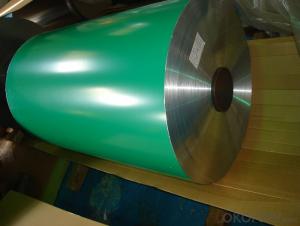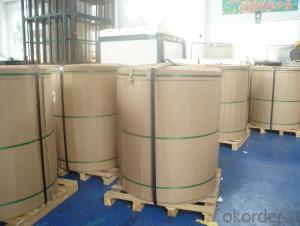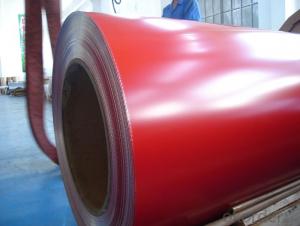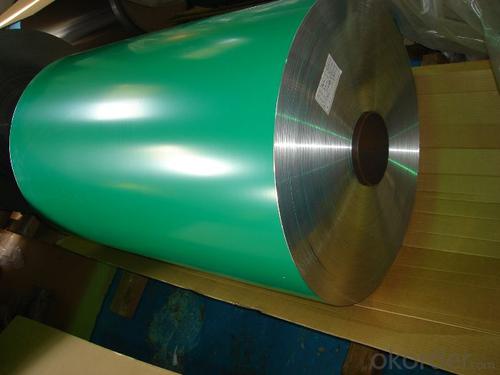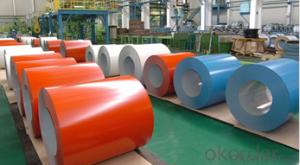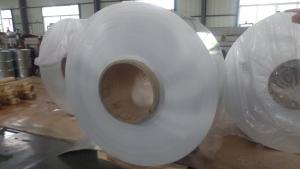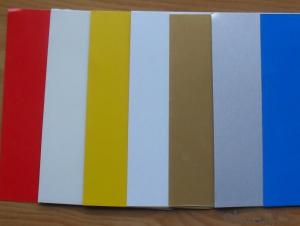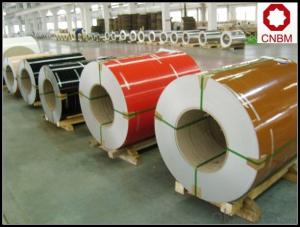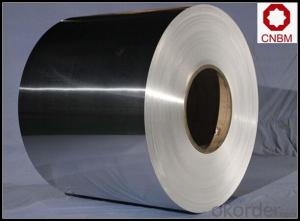Hot Rolled Aluminum Coil 5182 H48 Aluminum Can Tab Materials with Different Colors
- Loading Port:
- Shekou
- Payment Terms:
- TT OR LC
- Min Order Qty:
- 5 m.t.
- Supply Capability:
- 100000 m.t./month
OKorder Service Pledge
OKorder Financial Service
You Might Also Like
1.Structure of Aluminum Can Tab Materials 5182 H48 with Different Colors
We normally use 5182, H48 to produce coated aluminum coils, which are widely used in aluminum can tabs or ring-pulls. Based on ordinary aluminum, we add Mn and Mg, so as to increase tensile strength and elongation.
We have different colors for tabs, such as blue, red, transparent, etc. We also can adjust coating according to color of customers and offer personalized services.
We use large wave shear, transverse shear and longitudinal cut system so as to meet different specifications of customers.
2. Main Features of Aluminum Can Tab Materials 5182 H48 with Different Colors
• Light Weight
• High Flatness
• Good Weathering
• Colorful
• Recycling
• Saving Energy
• Rustproof
3. Aluminum Can Tab Materials 5182 H48 with Different Colors Images
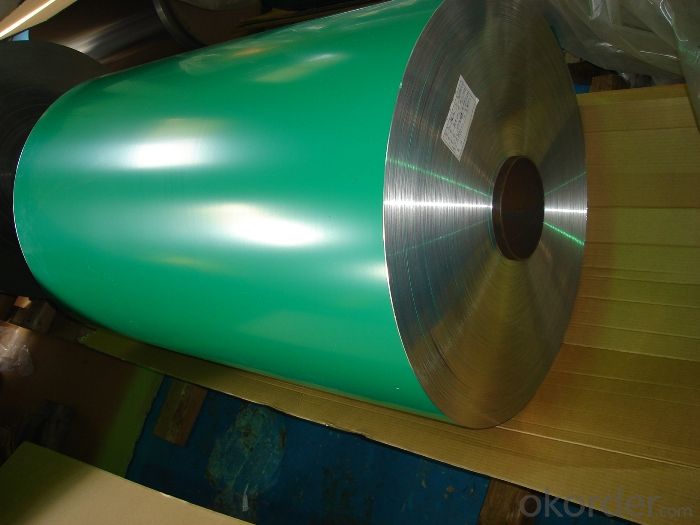
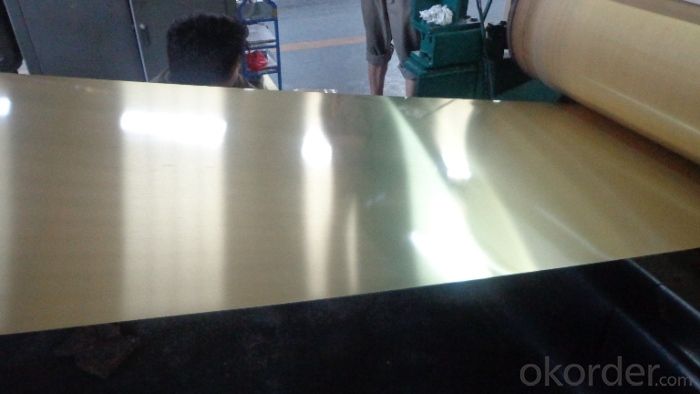
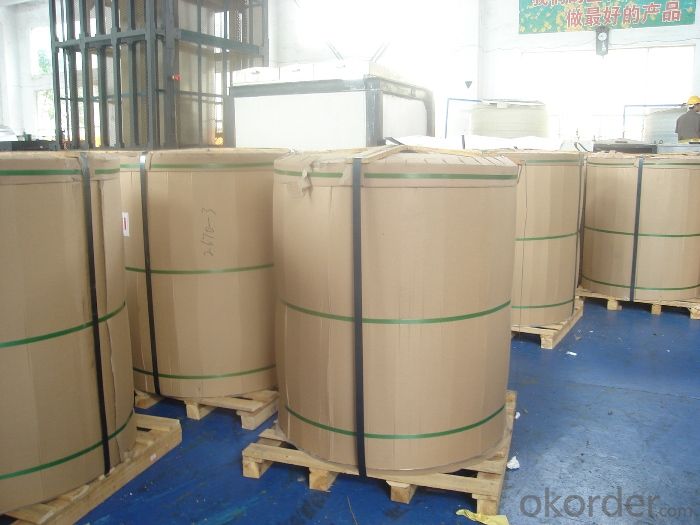
4. Specification of Aluminum Can Tab Materials 5182 H48 with Different Colors
ALLOY | TEMPER | THICKNESS | WIDTH | COIL OR LENGTH |
5052 5182 | H19 H36 H48 H49 | 0.22-0.5mm | 500-1600mm | AS PER YOUR REQUIREMENTS |
5. FAQ
A.What about inspections to guarantee quality?
For each order, we will arrange strict inspection for raw materials, inspection during production and inspection for finished goods.
With requirement of customers, we also can arrange the third party inspection.
B.What about delivery?
We will put order in production schedule after order gets confirmed against copy of TT or L/C. Normally it takes about one month for production. Exact shipment schedule is different based on different sizes and quantity.
C.What is the MOQ?
5 tons for each size.
D. Where have you exported?
We have exported to many countries. Main markets include South East Asia, Middle East, North America, South America, etc.
- Q: This question seeks to understand the environmental impact of discarded aluminum coils.
- <p>Discarded aluminum coils can have significant environmental impacts. They contribute to landfill waste and can potentially leach harmful substances into the soil and water if not properly managed. Aluminum production is energy-intensive, so recycling discarded coils reduces the demand for raw materials and conserves energy. However, if left in the environment, aluminum can also contribute to pollution and disrupt ecosystems. Proper recycling and disposal methods are crucial to mitigate these effects and promote sustainability.</p>
- Q: What are the common sizes of aluminum coils?
- The specific industry and application determine the varying common sizes of aluminum coils. However, different industries commonly utilize certain standard sizes. In the construction field, aluminum coils typically have a thickness ranging from 0.018 inches to 0.032 inches and can be as wide as 60 inches. These coils find their purpose in roofing, siding, and gutter applications. In the automotive sector, aluminum coils are frequently employed in the production of body panels and structural components. The sizes of these coils can greatly differ, varying from thin strips for small parts to larger coils with widths of up to 72 inches for bigger components. The packaging industry utilizes aluminum coils to manufacture foil products, including food packaging and industrial packaging. The thickness of these coils can range between 0.00017 inches and 0.0005 inches, while the widths commonly fall between 12 inches and 24 inches. It is important to acknowledge that these examples represent only a selection of common sizes, and specific applications may necessitate customized aluminum coil sizes. Furthermore, manufacturers possess the capability to produce coils in various dimensions to meet the specific requirements of their customers.
- Q: How do aluminum coils contribute to energy-efficient lighting installations?
- Aluminum coils play a significant role in enhancing the energy efficiency of lighting installations. Firstly, aluminum is a highly conductive material that efficiently transfers heat away from the lighting system. This prevents the accumulation of heat, which can diminish the performance and lifespan of the lighting fixtures. By dissipating heat effectively, aluminum coils help maintain optimal operating temperatures, ensuring the lights operate at their highest efficiency. Furthermore, aluminum coils are lightweight, making them easier to handle and install. This reduces the overall weight of the lighting fixtures, making them more convenient to mount and manipulate during installation. The reduced weight also translates into lower energy consumption during transportation and installation, ultimately contributing to energy efficiency in the long run. In addition, aluminum coils are highly durable and resistant to corrosion, which is crucial for lighting installations exposed to various environmental conditions. This durability minimizes the need for frequent replacements or repairs, reducing energy consumption associated with maintenance. Moreover, aluminum is a recyclable material, meaning that the coils can be easily reused or repurposed at the end of their life cycle. Recycling aluminum requires significantly less energy compared to producing new aluminum, resulting in a reduced carbon footprint and lower energy consumption overall. Overall, aluminum coils offer numerous benefits in terms of energy efficiency for lighting installations. Their efficient heat dissipation, lightweight nature, durability, and recyclability contribute to optimized performance, reduced energy consumption, and a more sustainable lighting solution.
- Q: What are the common surface treatments for aluminum coils in the automotive industry?
- Aluminum coils in the automotive industry undergo various surface treatments to improve their performance and appearance. Some popular treatments include anodizing, painting, cladding, clear coating, and polishing/buffing. Anodizing is a widely used treatment that forms a protective oxide layer on the surface of the coils. This is achieved by immersing the coils in an electrolytic solution and applying an electric current. Anodizing enhances corrosion resistance, durability, and allows for dye or paint application. Painting is another option for aluminum coil treatment, providing both aesthetics and protection against environmental factors. Coils are coated with either solvent-based or powder paint, offering an appealing appearance and safeguarding against scratches and UV radiation. Cladding involves bonding a layer of aluminum alloy with different properties onto the coil's surface. This treatment is commonly employed to enhance strength, thermal conductivity, or corrosion resistance. Cladding methods can include hot rolling, cold rolling, or explosive bonding. Clear coating is often applied to aluminum coils to create a transparent protective layer. This coating prevents corrosion, oxidation, and discoloration, while preserving the natural metallic appearance. Polishing and buffing are surface treatments that aim to improve the smoothness and shine of aluminum coils. Imperfections, scratches, and oxidation are mechanically removed through grinding or polishing. These methods are often used for decorative purposes in high-end automotive applications. These are merely a few examples of the surface treatments available for aluminum coils in the automotive industry. The choice of treatment depends on factors such as desired appearance, performance requirements, and environmental conditions the coils will face.
- Q: What are the different tempers of aluminum coils?
- Different levels of hardness and strength can be achieved through various heat treatments for aluminum coils, resulting in different tempers. These tempers alter the physical and mechanical properties of the coils to suit specific applications. Aluminum coils can undergo different tempering processes to modify their properties. The most common tempers for aluminum coils are as follows: 1. O Temper (Soft): This represents the annealed state of aluminum, where the metal is fully soft and easily moldable. It has low strength but excellent ductility, making it suitable for applications that require extensive shaping or bending. 2. H14 Temper (Half Hard): This offers moderate strength and hardness, while still maintaining some formability. It is used in applications that require a balance between strength and flexibility, such as roofing or cladding. 3. H18 Temper (Hard): This provides high strength and hardness, with reduced formability. It is commonly used in applications that demand structural integrity and resistance to deformation, such as automotive parts or industrial equipment. 4. H22, H24, H26 Temper (Extra Hard): These tempers are achieved through additional cold working or strain hardening processes. They offer even higher strength and hardness but sacrifice some ductility. They are often used in applications that require enhanced mechanical properties, such as aerospace components or high-stress structural parts. 5. T Temper (Tension Leveled): This involves stretching the aluminum coil beyond its elastic limit and then stabilizing it. It helps eliminate internal stresses and improve flatness, making it suitable for applications that demand precise dimensional stability, such as electronic devices or architectural panels. It's important to note that there are many other tempers available for aluminum coils, each designed to meet specific requirements. The choice of temper depends on factors such as the intended application, desired mechanical properties, and processing capabilities.
- Q: Are there any certifications or standards for aluminum coils?
- Certifications and standards exist for aluminum coils, ensuring their quality and performance. The Aluminum Association's Certification Program is widely recognized as the most prominent certification for aluminum coils. This program guarantees that the coils meet the specific standards and requirements established by the association. Moreover, multiple organizations such as ASTM International, ASME, and ISO have set various standards and specifications governing the manufacturing and performance of aluminum coils. These standards encompass crucial aspects like the coils' chemical composition, mechanical properties, and dimensional tolerances, guaranteeing compliance with industry requirements.
- Q: What types of aluminum coils are there that are designed for particular applications?
- <p>Yes, there are various types of aluminum coils designed for specific purposes. For instance, there are coils for construction, which are often used for roofing and siding. Coils for automotive applications are used in manufacturing car parts. Reflective coils are ideal for heat reflection in industries like food processing. Coils for electrical applications are used in transformers and wiring. Each type has specific properties like thickness, strength, and surface finish tailored to meet the requirements of their respective industries.</p>
- Q: This question asks for guidelines on safely transporting aluminum coils, which are large and heavy metal rolls used in various industries.
- <p>To transport aluminum coils safely, follow these steps: Use specialized vehicles with proper securing mechanisms to handle the weight and prevent rolling. Ensure the coils are balanced and secured with straps or chains to avoid shifting during transit. Maintain a steady speed to minimize vibrations that could cause damage. Avoid sudden stops or sharp turns. Keep the load covered to protect from moisture and dirt. Adhere to all legal weight and dimension limits for your route. Regularly inspect the vehicle and load for any signs of damage or instability. Always follow local transportation regulations and safety guidelines.</p>
- Q: I know when you stick weld aluminum you're more brazing than actually welding but i was just wondering about this, i want some electrodes just in case i need a temporary repair. Also what Amperage should i run it at,and what polarity?? my friend told me to run hotter than usual but hes only 14, and I dont know how reliable he is. Im 14 by the way also and have been welding for two years now and im always out running around the ranch doing small repairs. thanks ahead of time!
- Aluminum will oxidize quickly when it is heated in the air. You must have an inert gas around the weld when you are working it. A wire feed or T I G system is better than a stick machine. I suggest you do a lot of reading about aluminum and how to it is welded before you buy any tools. For small repairs that do not require much strength J B Weld will work.
- Q: How are aluminum coils annealed?
- Aluminum coils are typically annealed through a process known as heat treatment. This involves heating the coils to a specific temperature and then slowly cooling them down. The purpose of annealing is to soften the aluminum and improve its ductility, making it easier to work with. The first step in annealing aluminum coils is to clean them thoroughly to remove any contaminants. The coils are then placed in a furnace, which is heated to the desired temperature. The temperature and duration of the annealing process depend on the specific grade and thickness of the aluminum being treated. Once the coils reach the desired temperature, they are held at that temperature for a predetermined amount of time. This allows for the internal structure of the aluminum to become more uniform and relieves any internal stresses that may have developed during the manufacturing process. After the annealing process is complete, the coils are slowly cooled down in the furnace. This slow cooling is important to prevent the formation of any new internal stresses. Once the coils have cooled to room temperature, they are ready for further processing or use. In some cases, a process known as quenching may be used after annealing. Quenching involves rapidly cooling the aluminum by immersing it in a quenching medium, such as water or oil. This can help to further improve the mechanical properties of the aluminum, such as its strength and hardness. Overall, the annealing process for aluminum coils is a carefully controlled heat treatment that aims to improve the metal's properties and make it more suitable for various applications.
Send your message to us
Hot Rolled Aluminum Coil 5182 H48 Aluminum Can Tab Materials with Different Colors
- Loading Port:
- Shekou
- Payment Terms:
- TT OR LC
- Min Order Qty:
- 5 m.t.
- Supply Capability:
- 100000 m.t./month
OKorder Service Pledge
OKorder Financial Service
Similar products
Hot products
Hot Searches
Related keywords
